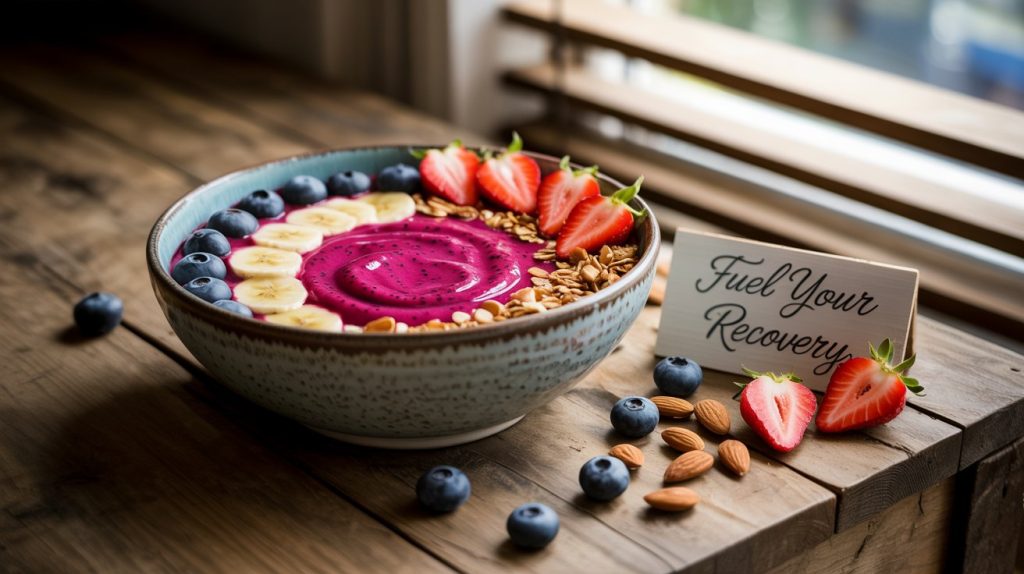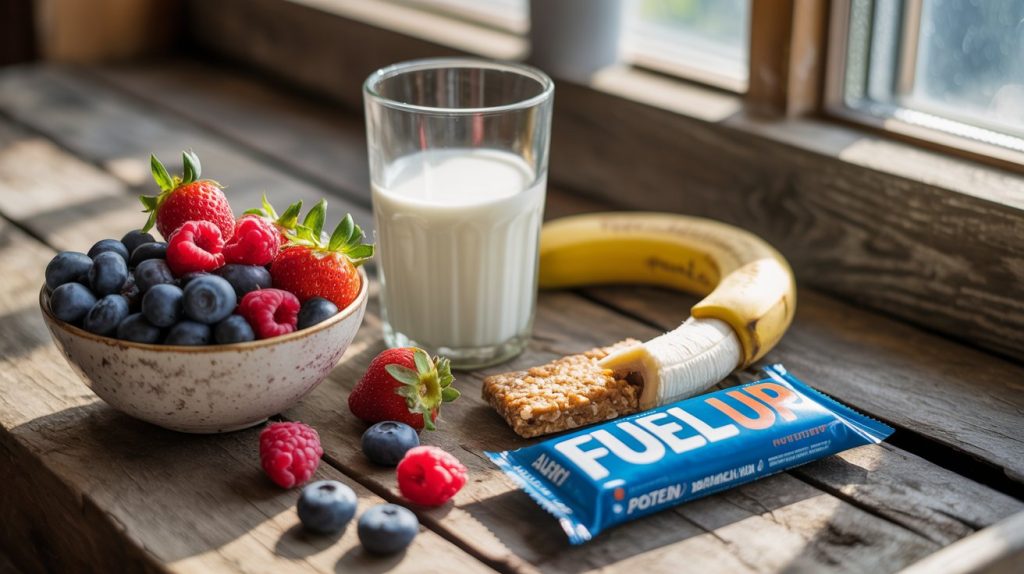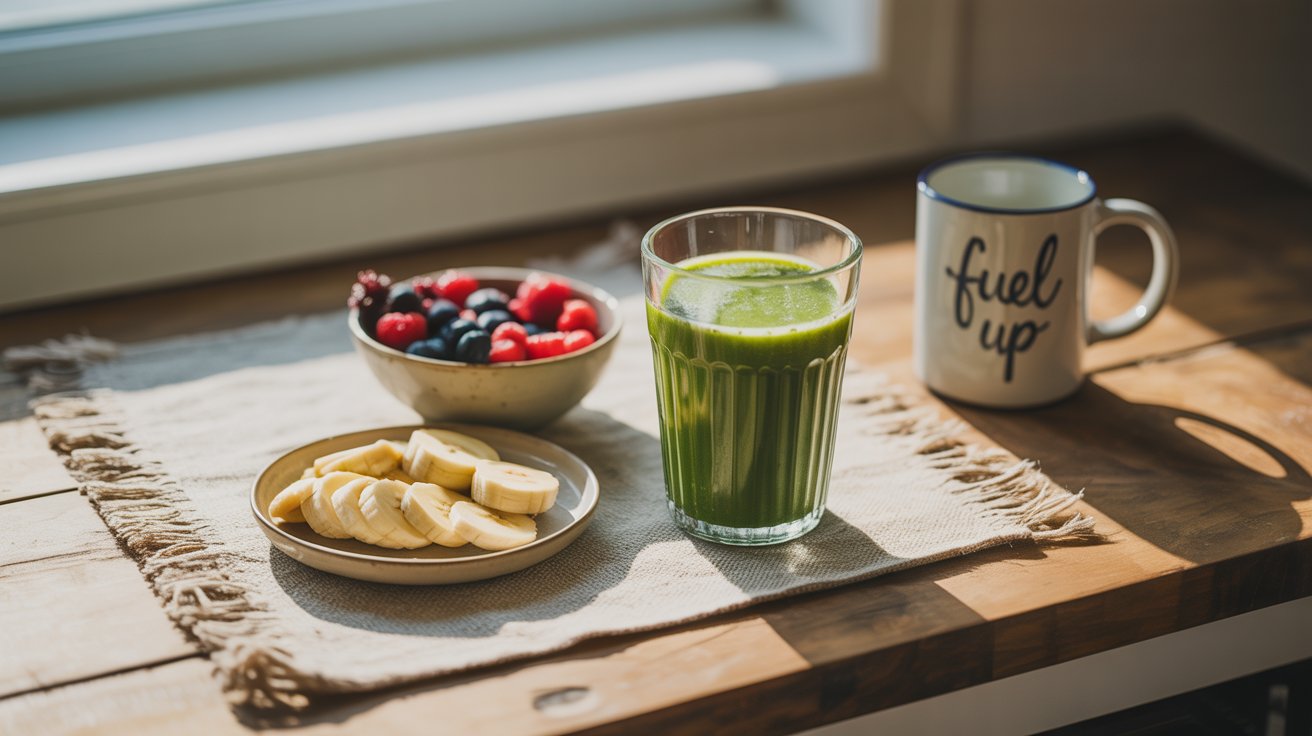Refuel faster with the 10 Best Post-Workout Snacks for muscle recovery, energy boost, and optimal results after every workout.
Just finished a tough workout and now your stomach is growling? You’re not alone. After exercise, your body’s craving the right kind of fuel to help muscles recover, beat tiredness, and refill your energy tank. Maybe you wonder—what should you eat to speed up recovery and really make those workouts count?
It’s easy to reach for fast food or sweets. But smart post-workout snacks can do more: they boost muscle repair, lower soreness, and help you bounce back stronger. The challenge is knowing which snacks actually help and which are just empty calories.
Good news—you don’t need to be a nutrition expert to get this right. With the simple snack ideas and dietitian-approved tips here, you’ll know exactly what to eat, when to eat it, and why it helps your body. Also, you’ll find snacks for every craving—creamy, crunchy, sweet, savory, even options for plant-based diets.
Ready to feel energized and recover better after every sweat session? Let’s dig into the 10 best post-workout snacks to help you recover fast and stay on top of your goals!
Why Post-Workout Nutrition Matters
Now that you know the challenge isn’t just about stopping hunger after your workout, it’s time to see why what you eat matters so much. Think of your workout as only half the job—what you do next makes a huge difference for your body. Nutrition experts agree: post-workout snacks are not just a treat, they’re your body’s best shot at real recovery.
Let’s break it down. After exercise, your muscles are like sponges, ready to soak up nutrients for rebuilding and future strength. According to May Zhu, RDN, “Protein helps repair, build, and maintain muscle post-workout, but carbs will also help replenish glycogen stores and aid with recovery.” Carbs are your main energy source during exercise.
When you finish, those stores are low. Adding protein and carbs together—think a yogurt parfait or peanut butter sandwich—gives your body both the building blocks and fuel to recover faster. Studies that experts cite show this combo maximizes muscle repair and energy storage.
Timing actually matters too. Marisa Moore, RD, explains your body is most receptive within the first 30 minutes to two hours post workout. That doesn’t mean you need to chug a shake right away, but don’t wait too long, either. If you put off eating, you’re missing the window when your muscles are best at refueling.
Why bother? The right snack reduces muscle soreness, restores lost energy, and can even help you bounce back quicker for your next session. Maya Feller, MS, RD, adds, “What you eat depends on how hard and long you worked out, but combining carbs and protein right after is key for muscle synthesis and glycogen recovery.”
So, eating a smart snack soon after exercise isn’t just about feeling full—it’s about rebuilding, staying energized, and getting ready to crush your next workout.
Coming up, let’s look at some simple rules and key tips for building the perfect recovery snack.
Essential Guidelines for Choosing Post-Workout Snacks
Building on the importance of eating the right foods after exercise, you might be wondering—what exactly makes a post-workout snack effective? The experts agree: not all snacks are created equal. Let’s walk through the simple guidelines that dietitians and fitness pros actually use, so you can make choices that really help you recover.
Start with the macronutrient balance. Dietitians like May Zhu and Marisa Moore recommend aiming for a 2:1 or 3:1 carb-to-protein ratio. This means for every gram of protein, you should get two or three grams of carbs.
Why? Carbs help refill the glycogen your muscles lose during exercise, while protein repairs and rebuilds muscle tissue. For example, a parfait with 20 grams of protein and 40-60 grams of carbs fits this guideline and powers up muscle recovery.
Don’t forget healthy fats and hydration. While you don’t need a lot of fat right after working out, a little bit is fine—think nuts, avocado, or olive oil in your snack. May Zhu points out there’s no strong evidence that a small amount of fat slows down recovery.
Hydration is just as crucial. As seen in Michael Wing’s blog, water helps your body process nutrients and bounce back faster, so have water or a hydrating drink with your snack.
Other considerations matter too. Marisa Moore reminds you to adjust your snack size and timing based on your workout intensity, length, and your next meal. After a tough or long session, you’ll need more carbs and protein.
If you’re about to sit down for a meal, you might not need a snack at all. Asked if you must eat right away, experts suggest the best window is 30 minutes to two hours post-exercise, but you do have flexibility—especially if you ate before working out.
Finally, store-bought and homemade snacks both work. Store-bought bars are handy (look for 10-15g protein and simple, natural ingredients), but homemade is often cheaper and lets you control sugar and additives.
Options like Greek yogurt with fruit, DIY trail mix, or wraps with chicken and veggies are all easy and let you tweak the portions to fit your needs.
Up next, get ready for the real fun—we’ll dig into the top 10 snack ideas that fuel recovery and actually taste great!

Top 10 Post-Workout Snack Recommendations (with Benefits)
Now that you know how to build your snack for muscle repair and energy, let’s get specific. Here comes the fun part—real snack ideas hand-picked by dietitians, trainers, and food experts. These aren’t just generic choices; each one is picked for hitting the perfect protein-carb balance, staying delicious, and being easy to make or pack. We’ll walk through formats, recipe tweaks, and the actual benefits you get from each snack.
1. Greek Yogurt with Berries and Granola (Protein, Probiotic
s, Vitamins)
Start with a cup of Greek yogurt. It’s loaded with protein—up to 20 grams per serving—and full of probiotics for healthy digestion. Toss in half a cup of mixed berries (think blueberries, strawberries, raspberries), and sprinkle on a quarter cup of granola for extra fiber and crunch. Want it vegan? No problem—swap in coconut or soy-based yogurts with at least 10 grams protein (as recommended by May Zhu, RDN). This combo fills you up fast, supports muscle healing, and gives a burst of antioxidants.
2. Homemade Trail Mix or Fruit & Nut Bars (Customizable, Balanced Energy)
Here’s your “chocolate for grown-ups” treat. Mix unsalted nuts, seeds (sunflower, chia, flax), and plenty of dried fruit like raisins or cranberries. Add 90% dark chocolate chips for a bonus antioxidant kick. The blend of carbs and healthy fats offers a steady energy boost. If you prefer bars, press the mix into a pan, chill, and cut into squares. No added sugar or mystery ingredients.
3. Cheese & Whole-Grain Crackers or String Cheese (Portable, High-Protein)
Keep it simple—and kid-friendly! Grab a string cheese or a few slices of mozzarella, Swiss, or gouda. Pair with 5-6 whole grain crackers. You get roughly 7 grams of protein and 20 grams of carbs. These are easy to stash in your bag, perfect for workouts on-the-go.
4. Peanut/Almond Butter Sandwich or Rice Cakes (Classic Carb-Protein Combo)
Spread 2 tablespoons of peanut or almond butter on a slice of whole-grain bread or a couple of rice cakes. Add sliced banana for more potassium—great for tired muscles. This classic will give you long-lasting energy from healthy fats, a touch of protein, and enough carbs to refuel.
5. Protein Smoothies/Shakes (Fast-Digesting, Customizable)
Protein smoothies are favorites for good reason: they digest fast and deliver what your body needs. Blend one scoop of protein powder (whey or plant-based), a banana, and almond milk. Toss in some spinach or berries for vitamins and fiber. May Zhu recommends making smoothies at home to guarantee protein quality—skip the bottled stuff!
6. Eggs with Toast or Whole-Grain Crackers (Complete Protein and Carbs)
Eggs are a powerhouse for muscle recovery. Two hard-boiled eggs have 12 grams of complete protein. Serve them on a slice of whole-grain toast or with fiber-rich crackers. Add hot sauce, avocado, or herbs for extra flavor and nutrients.
7. Cottage Cheese with Fruit (Slow-Digesting Casein, Carbs, and Calcium)
Scoop a cup of low-fat cottage cheese and top with pineapple chunks, berries, or peaches. This snack brings slow-digesting casein protein, perfect for steady muscle repair. You also get some calcium for bone health. Bonus: it keeps you fuller for longer, so you’re not tempted to snack again in an hour.
8. Grilled Chicken/Turkey Wraps or Roll-Ups (Lean Protein, Healthy Fats, Veggies)
Wrap deli turkey or grilled chicken with spinach, sliced avocado, and a touch of hummus or mustard in a whole-grain tortilla. Add bell peppers for crunch and extra vitamins. This makes a meal in itself—tons of protein, healthy fats, and fiber. Easy to meal-prep and pack.
9. Hummus & Veggie Sticks (Plant Protein and Fiber)
Dip carrot sticks, cucumber, and bell peppers in a cup of protein-rich hummus. You get a blend of plant-based protein and complex carbs. This snack is light but surprisingly filling because of the fiber.
10. Chocolate Milk (Researched Carb/Protein Ratio for Recovery)
Yes, really. Dairy or plant-based chocolate milk matches the ideal carb-to-protein ratio for muscle recovery. Studies cited by May Zhu confirm it helps replenish energy and kick-start muscle building. Just watch out for added sugars, and if you’re dairy-free, choose a high-protein plant milk.
Every snack here is backed by real expert advice and chosen to fit different tastes, from quick grabs to make-at-home treats. Whether you want creamy, crunchy, sweet, or savory, you can enjoy recovering well and feeling satisfied after each workout.
Keep reading for even more unique and diet-friendly snack ideas that go beyond the basics—next up: creative options for every lifestyle!
Additional Healthy and Creative Post-Workout Snack Ideas
Building on the top 10 snacks we just covered, it’s time to get even more creative with your post-workout fuel. Maybe you crave something a little different. Or perhaps you follow a specific diet, like plant-based or high-protein, and want more variety.
Let’s explore extra ideas inspired by real expert recommendations that speak to diverse tastes and global flavors.
First up: energy bites (sometimes called power balls). These are a hit because you can prep them in minutes and customize every ingredient. Blend almond butter, a scoop of protein powder, a drizzle of honey, and your favorite dried fruit into a thick dough.
Roll into bite-sized balls—seriously, they store well and are easy to grab when you’re rushing out the door. According to nutrition coach Gina (from GoDirectly), energy bites deliver a great balance of carbs, protein, and healthy fats to promote muscle repair and keep cravings in check.
Looking for something plant-based and more savory? Try a quinoa bowl or salad loaded with beans or roasted veggies. Quinoa is a complete protein and pairs perfectly with black beans, chickpeas, or colorful roasted vegetables like bell peppers and zucchini.
Add a squeeze of lime and a handful of cilantro for extra flavor. One recipe (Oils We Love, 2025) suggests cooked quinoa tossed with black beans, cherry tomatoes, and fresh herbs—a hearty, fiber-rich combo that keeps you full and boosts recovery.
Now, let’s talk about edamame. These little green soybeans are total protein powerhouses—a full cup packs around 17 grams! Just boil or steam, sprinkle on sea salt, and snack away. Edamame is also vegan, so it’s perfect for plant-based diets and is featured in several recommended lists as a portable, nutritious option.
If you want regional favorites, don’t overlook snacks like boiled sprouts and seasoned paneer cubes. Boiled sprouts with chopped cucumber, tomatoes, and lemon (as shown in Times of India, June 2025) boost your post-exercise iron, fiber, and vitamin C, supporting recovery and digestion.
For a vegetarian protein punch, try paneer cubes seasoned with pepper or herbs, or go for sweet potato and black bean tacos. These tacos combine slow-burning carbs, plant protein, and satisfying spices—just fill a corn tortilla with sautéed sweet potatoes and black beans for a globally inspired snack.
So, you see, post-workout options go way beyond plain shakes or bars. No matter your taste or dietary needs, there’s a protein-carb snack out there with your name on it.
Next, let’s make sure you’re actually getting the best results from these snacks. Ready for some smart snacking tips and pro tricks? Let’s dive in!

Smart Post-Workout Snacking Tips and Common Mistakes
Now that you’ve filled your toolbox with snack ideas for muscle recovery, let’s make sure you’re actually getting the most out of them. Smart choices can boost your results, but a few common mistakes can easily undo your hard work. Experts and trainers have shared some real-life strategies to keep you on track for faster and stronger recovery.
First up, prepping snacks ahead of time is a total game changer. Remember how we talked about the temptation to grab junk food or whatever is fastest after you exercise? If you plan and prep your snacks—even just the night before—it’s easier to make a healthy choice when your body is running on empty.
Dietitians from Oils We Love and GoDirectly suggest making a batch of trail mix, prepping cottage cheese and fruit bowls, or even rolling up turkey-avocado wraps in advance. Keep them in your refrigerator or gym bag, and you won’t be tempted by the drive-thru or vending machine.
Speaking of drive-thrus, one of the biggest mistakes is reaching for processed sugars and junk food after a workout. Sure, your body is craving energy, but May Zhu and other RDs warn that treats like candy bars and soda give you a quick spike followed by a crash.
Even some packaged “protein” snacks have more sugar than a candy bar! These foods can actually slow recovery, according to trainers in the articles, and might make you crave even more sugar later.
That leads to another smart tip: check those labels closely on protein bars and “healthy” store-bought snacks. Marisa Moore advises you to pick bars with at least 10-15 grams of protein, minimal ingredients, and little or no added sugar. Homemade or simple options, like fruit with nut butter or DIY granola, let you control the ingredients.
Hydration is another step you can’t skip. As highlighted in Michael Wing’s blog and GoDirectly, drinking water right after exercise is just as important as the food you eat.
Water helps you absorb the nutrients from your snack and keeps your muscles working smoothly. If you’re running short on energy or feeling sore, dehydration could be the real problem!
Honestly, it’s pretty simple—set yourself up with real food, limited added sugar, and plenty
of water. With a little planning and label-reading, you’ll refuel smarter and recover faster. So, next time you unwrap that snack, ask: is this helping my progress, or just filling a craving? With these pro tips, you’ll be fueled and ready for your next session.
Let’s wrap up your journey to smarter post-workout snacking. You’ve seen how the right protein-carb balance—ideally 2-3:1 carbs to protein—turbocharges recovery, reduces muscle soreness, and restores your energy.
Snacks like Greek yogurt with berries, peanut butter sandwiches, and protein smoothies aren’t just delicious—they’re strategic fuel. And don’t forget the variety: from hummus with veggies to cottage cheese and fruit, even energy bites and quinoa bowls, there’s an option for every craving and dietary need.
Timing matters—aim for that 30-minute to 2-hour window after exercise for best results. And by prepping ahead, reading labels, and staying hydrated, you’ll sidestep common pitfalls like sneaky added sugars and junk food traps.
With these dietitian-approved tips and snack ideas, you’ve got everything you need to recover faster and hit your fitness goals with confidence. So next time your stomach grumbles post-workout, grab a real snack that works as hard as you do. Your best recovery starts with your next bite—are you ready to fuel your future?
Frequently Asked Questions
Can you customize post-workout snacks for food allergies or special diets?
Absolutely! Many snacks can be adapted for common allergies and preferences. For example, if you’re dairy-free, use plant-based yogurt or milk in parfaits and smoothies. Nut-free folks can swap nut butters for sunflower seed butter, and vegan eaters can use tofu, beans, or vegan protein powder for plant-based protein.
Can you eat a meal instead of a snack after working out?
Yes, if your workout ends close to mealtime, you can have a balanced meal instead of a snack. Just make sure it combines both protein and healthy carbs—like grilled chicken, brown rice, and veggies—to support muscle repair and refill energy stores.
Can you skip a post-workout snack if you’re not hungry?
If you’re not hungry after lighter exercise or just ate before your workout, it’s okay to skip a snack. However, after tough or long workouts, it’s best to have something within two hours to help your muscles recover and reduce soreness.
Can you prep post-workout snacks ahead of time?
Definitely! Prepping snacks like trail mix, energy bites, or turkey roll-ups makes it easier to eat healthy when you’re tired and hungry. Store things like cottage cheese and fruit in the fridge or keep nut butter packets and protein bars in your bag for convenience.
Can you use store-bought protein bars or shakes for recovery?
Store-bought options can work in a pinch—just read labels. Pick bars or shakes with recognizable ingredients, at least 10–15 grams of protein, and low added sugar. Homemade snacks still give you the most control over quality, but a good protein bar is handy when you’re on the go.
Can you drink only water after working out, or do you need a snack every time?
Water is always important after exercise to help your body recover. If your next meal is soon or your workout was short, water alone may be enough. For longer or harder sessions, pairing hydration with a carb-and-protein snack speeds up recovery and helps prevent soreness.


